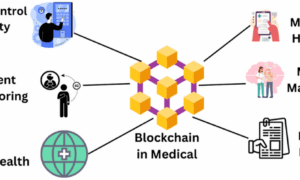Given how quickly digital tools and software solutions are developing, healthcare providers are constantly challenged to modernize while adhering to stringent regulatory frameworks. Healthcare Technology Consulting Services play a crucial role in guiding organizations through this transformation.
Traditional IT infrastructures are no longer sufficient to address the growing demands of data management, security, and patient care. Outdated systems slow down operations and expose healthcare institutions to cybersecurity risks, inefficiencies, and compromised patient care. To address these risks, organizations must adopt a strategic approach to implement modern Healthcare IT Solutions that align with compliance, security, and innovation.
To effectively handle this transformation, healthcare businesses must rely on emerging technologies such as cloud computing, data analytics, and AI-powered security frameworks. These technologies improve operational efficiency while ensuring seamless interoperability, patient data security, and regulatory compliance. Integrating them allows healthcare practitioners to enhance workflows and achieve better patient outcomes.
Cloud as the Catalyst: Beyond Cost Savings to Strategic Transformation
Cloud computing is no longer only a cost-cutting strategy; it has become a driver of digital transformation in healthcare. Organizations must move beyond simple lift-and-shift cloud migration to adopt cloud-native architectures that promote efficiency and scalability.
Key Considerations for Cloud Adoption:
1) Multi-Cloud vs. Hybrid Cloud – Selecting the exemplary cloud architecture is crucial for ensuring compliance with healthcare regulations while maintaining scalability and flexibility. The best of both worlds is offered by hybrid cloud solutions that enable on-premise control while leveraging the power of cloud scalability.
2) AI-driven Cloud Governance – Automation is critical for managing cloud security, policy enforcement, and compliance. AI-powered governance frameworks allow for proactive surveillance of threats, policy enforcement, and automated security gap correction.
When integrated strategically, cloud computing enables healthcare organizations to optimize operations, enhance patient experiences, and reinforce compliance while reducing IT overhead.
Data Analytics: The Backbone of Future-Proof Healthcare IT Solution
Data analytics promotes better patient outcomes and well-informed decision-making. Healthcare Data Engineering Services enable organizations to extract useful conclusions from enormous volumes of both structured and unstructured data.
Transformative Data Analytics Trends:
1) Real-time Predictive Analytics – Healthcare is shifting from reactive care to proactive patient management through AI-driven predictive models. These models help identify early warning signs of long-term illnesses, decreasing readmissions to hospitals and enhancing patient care.
2) Federated Instruction for Data Privacy – Federated learning allows healthcare organizations to work together on AI models without disclosing raw patient data. This protects data privacy while enhancing machine-learning capabilities throughout hospitals.
3) Breaking Data Silos with Interoperability – Many healthcare organizations struggle with disconnected systems. Implementing Healthcare Data Engineering Consulting Services enables seamless interoperability between EHRs, EMRs, and analytics platforms, improving data accessibility and patient outcomes.
Strategies for Optimizing IT Infrastructure with Cloud & Data Analytics
To optimize IT infrastructure with cloud and data analytics, healthcare institutions need to take a strategic and phased approach. A well-planned modernization strategy ensures seamless implementation, cost-effectiveness, and long-term sustainability:
1) Conducting IT Assessments – The first step in IT optimization is to identify legacy system inefficiencies and areas for improvement.
2) Implementing a Cloud-First Approach – The transition to a cloud-native architecture assures scalability, security, and compliance.
3) Leveraging Big Data and Analytics – Integrating data analytics platforms enables healthcare providers to use predictive insights to make better decisions.
4) Ensuring Interoperability with EHR/EMR Systems – A smooth flow of patient information across many platforms results in better healthcare outcomes.
5) Strengthening Cybersecurity and Compliance Measures – Implementing AI-driven security frameworks, encryption methods, and zero-trust models ensures strong data security.
6) Training Staff for Smooth Technology Adoption – Digital transformation requires a well-equipped workforce to handle new technologies and workflows.
Infrastructure Resilience: Cybersecurity, Disaster Recovery & AI-powered Threat Detection
Infrastructure resilience has become a primary focus as cyber threats to the healthcare industry increase. Organizations must employ current security methods to reduce risks and maintain continuous patient care.
Key Security Strategies:
1) Ransomware-proofing with zero-trust models – Adopting zero-trust design eliminates the assumption that any user or system is inherently trustworthy, lowering the risk of unwanted access.
2) Blockchain for Protecting Patient Data – Blockchain technology improves data integrity, reduces fraud, and promotes transparency in medical record administration.
3) Automated Disaster Recovery & AI-based Threat Detection – AI-driven anomaly detection and automated failover mechanisms help healthcare organizations recover quickly from cyberattacks and operational disruptions.
Conclusion
Organizations that adopt Healthcare Technology Consulting Services can cut through the complexity of contemporary healthcare IT while achieving compliance, security, and operational effectiveness. At Cybage, we specialize in delivering the most advanced healthcare IT solutions, including cloud-driven transformations, AI-powered security frameworks, and data analytics consulting.
With years of experience in healthcare technology consulting, our expertise extends to optimizing IT infrastructures, ensuring compliance, and implementing scalable solutions tailored to the unique needs of healthcare institutions.



































